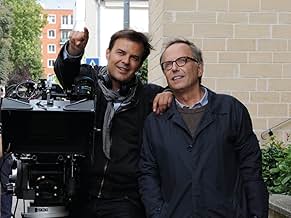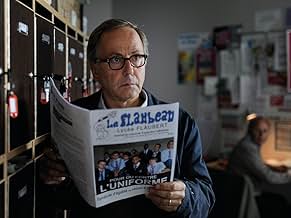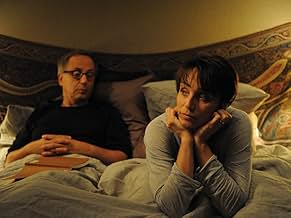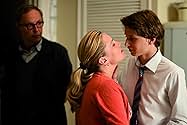Dans la maison
- 2012
- Tous publics
- 1h 45min
NOTE IMDb
7,3/10
35 k
MA NOTE
Un professeur de lycée se retrouve mêlé dans l'histoire progressivement transgressive d'un étudiant surdoué à propos de sa relation avec la famille d'un ami.Un professeur de lycée se retrouve mêlé dans l'histoire progressivement transgressive d'un étudiant surdoué à propos de sa relation avec la famille d'un ami.Un professeur de lycée se retrouve mêlé dans l'histoire progressivement transgressive d'un étudiant surdoué à propos de sa relation avec la famille d'un ami.
- Réalisation
- Scénario
- Casting principal
- Récompenses
- 10 victoires et 23 nominations au total
Jana Bittnerová
- La doublure de la jumelle
- (as Jana Bittnerova)
Avis à la une
Francois Ozon is the director of this provocative and unusual film that takes the viewer inside the minds of the characters. It is not a traditional movie with a beginning and an end but a study of a period in the lives of different people. In this movie, a high school student named Claude catches the attention of his teacher named Germain, through an essay that explores the family of another student, named Raffa. Claude has begun to tutor Raffa in mathematics. At first the teacher, as the student's mentor, is hesitant about the breach of privacy with this series of essays but succumbs to the the temptation to become a voyeur. Each essay ends with the notation...To Be Continued. Both student and teacher are seen as outsiders in their own worlds and are strangely attracted to the family. The student gently mocks the family he is observing as dull and middle class. The teacher can understand this estrangement from their world because Claude is from a different world and the teacher himself is something of an outsider in his own world. He encourages the boy to continue his writing because he feels the boy has potential as a writer. As the movie goes along, we see the family of Raffa behaving as many other families pursuing money and status. The boy and his father are both named Raffa so they become the Raffas (plural). The student has a romantic interest in the mother, who seems to be the real reason he wants to explore the home. The desire for sexual encounters is present throughout the movie and seems to come out in a few surprising and light hearted episodes. We also see how Raffa and Claude interact with their teacher and the other students and their own families. The wives of Germain the teacher and Raffa Sr. are also interesting with one a traditional woman handling the domestic lives of the two Raffas. Meanwhile, Germain's wife manages an art gallery for two wealthy sisters, who she is trying to keep happy by making the gallery profitable. The movie is an interesting view of modern angst with the pressures to conform competing with the desire to be independent and on occasion, straying from the accepted standards. All in all, it is a provocative look at the different lives of people who interact and occasionally come into conflict. At the end, we see the message: to be continued.
This awkward and witty film is based on the play The Boy in the Last Row by Juan Mayorga, i.e. the script emanates from a solid creation. The run of the events is smooth, but sometimes it is tricky to follow the line between truth and fantasy, including the ending scenes, and some deeds remained mystery to me. In spite of serious topics touched (e.g. alienation, growing pains, loneliness, generation gaps), there are several funny scenes, particularly gallery-related ones, and strong performances provide additional value to the film (Fabrice Luchini as Germain Germain, Ernst Umhauer (skilfully depicting an 16-year-old while being 22) as Claude Garcia, Kristin Scott Thomas (in fluent French) as Jeanne Germain, Emmanuelle Seigner as Esther Artole - in particular). Hopefully, no remake will be made, as the sound of French and supposition of Frenchmen are just appropriate for such a film.
Recommended to all those fond of films with twists and not afraid of subtitles.
Recommended to all those fond of films with twists and not afraid of subtitles.
For his thirteenth feature film, French New Wave director Francois Ozon has outdone all acclaim given to his 2002 remake of "8 Women" with a mischievous and dysfunctional tale, of what can be perceived as
coming-of-age.
A black comedy conflated with so much grandeur from literary greats to post-modern poioumena, you cannot help but wave the white flag and just go along in service of jest and sheer curiosity.
Adapted from a brilliant play written by Juan Mayorgo, this film is a meta-narrative centered on Claude Garcia (Ernst Umhauer) -- a sixteen year old loner who intrudes upon the home life of fellow student Rapha Jr., and writes about it. What begins as a one-off weekend assignment for literature class, escalates with great passion and frequency when Claude's teacher, Germaine (Fabrice Luchini) detects flashes of talent and decides to groom the teenager.
Here, Ozon proposes a three-fold narrative weaving through the surface of three realities -- Germaine's growing obsession with Claude's story imitates the viewers' relationship with Ozon's film (and perhaps soap opera addiction), and Claude as a self-conscious narrator of the events occurring inside Rapha's house.
When the film begins, Claude is unhappy with a lonely life and clearly needs to distract himself with wholesome family warmth. Having witnessed Rapha's close relationship with parents Rapha Sr. and Esther at the school gate, strikes a friendship with the boy when semester begins. Establishing himself as a math tutor and study mate, Claude quickly wins their affection and trust. Thrilled by this opportunity to experience life with a sense of belonging, yet predisposed to primitive urge, Claude's desire swells into furtive yearning for Esther. And naturally, things get complicated.
As Germaine's involvement with Claude's writing departs from passive reader, to that of a story-telling coach superimposing rules of dramatic structure, it occurs to the viewer that he may very well be a shaping hand in the outcome of this voyeuristic experiment.
Of course, the fabrics of fiction and reality overlap but they do not confuse -- the satirical logic unfolds in ways that are thought- provoking, humorous and downright captivating.
cinemainterruptus.wordpress.com
A black comedy conflated with so much grandeur from literary greats to post-modern poioumena, you cannot help but wave the white flag and just go along in service of jest and sheer curiosity.
Adapted from a brilliant play written by Juan Mayorgo, this film is a meta-narrative centered on Claude Garcia (Ernst Umhauer) -- a sixteen year old loner who intrudes upon the home life of fellow student Rapha Jr., and writes about it. What begins as a one-off weekend assignment for literature class, escalates with great passion and frequency when Claude's teacher, Germaine (Fabrice Luchini) detects flashes of talent and decides to groom the teenager.
Here, Ozon proposes a three-fold narrative weaving through the surface of three realities -- Germaine's growing obsession with Claude's story imitates the viewers' relationship with Ozon's film (and perhaps soap opera addiction), and Claude as a self-conscious narrator of the events occurring inside Rapha's house.
When the film begins, Claude is unhappy with a lonely life and clearly needs to distract himself with wholesome family warmth. Having witnessed Rapha's close relationship with parents Rapha Sr. and Esther at the school gate, strikes a friendship with the boy when semester begins. Establishing himself as a math tutor and study mate, Claude quickly wins their affection and trust. Thrilled by this opportunity to experience life with a sense of belonging, yet predisposed to primitive urge, Claude's desire swells into furtive yearning for Esther. And naturally, things get complicated.
As Germaine's involvement with Claude's writing departs from passive reader, to that of a story-telling coach superimposing rules of dramatic structure, it occurs to the viewer that he may very well be a shaping hand in the outcome of this voyeuristic experiment.
Of course, the fabrics of fiction and reality overlap but they do not confuse -- the satirical logic unfolds in ways that are thought- provoking, humorous and downright captivating.
cinemainterruptus.wordpress.com
There are certainly many meanings underneath the veil of comedy of this movie. Indeed, defining "Dans la maison" a comedy would be reductive, in the same way as thriller sounds out of tune. And it's really difficult to assign a precise category to it. It's a multifaceted movie, showing different levels of interpretation. From the point of view of the teacher, it's a subtle reflection of a middle aged failed man, who has to come to terms with his failure as a writer, and his incapability to inspire enthusiasm in class of bored students. From the point of view of the wives, it's a refined portrait of middle aged unsatisfied women, and their need to find any kind of escape or consolation. But above all, the movie offers a lucid and intelligent gaze on people's voyeuristic curiosity, on how much we are ready to do in order to see what happens behind closed doors and walls, and here the pair teacher-student works perfectly, and develops through the quick-paced writing of a story where the boundaries between reality and fiction become more and more faded, thus making it intriguing and engrossing. On this aspect, the movie is also a reflection on the process itself of artistic creation, which can seduce the reader or the viewer with an incredible power of attraction. A movie which certainly offers a perfect balance between suspense and entertainment, supported by a talented young and mature cast, involving the viewer till the utmost, and moving us to an unpredictable and gripping finale.
A wicked little movie that tries to brake boundaries and more than the fourth wall. It raises up a lot of questions and puts up the mirror to a lot of things, while continuously being funny and wicked at the same time. A hilarious attempt at describing what Art means nowadays or how we try to interpret it. Maybe even how we try to create it.
There is more than one story strand in this movie and they all get at least somewhat explored. And while some of those strands may feel like a cliché, the head on approach make them feel like a fresh take on it. You have to have an open mind about the movie and the way it is shot and told, but if you can do that, you might be able to enjoy this very much. Multiple views can also bring up new and exciting things you might not have seen first time around. Whatever the case, I can recommend this to anyone who wants to be intellectually challenged by watching a movie.
There is more than one story strand in this movie and they all get at least somewhat explored. And while some of those strands may feel like a cliché, the head on approach make them feel like a fresh take on it. You have to have an open mind about the movie and the way it is shot and told, but if you can do that, you might be able to enjoy this very much. Multiple views can also bring up new and exciting things you might not have seen first time around. Whatever the case, I can recommend this to anyone who wants to be intellectually challenged by watching a movie.
Le saviez-vous
- AnecdotesErnst Umhauer said this about the character he plays in the movie: "He confuses his writing with reality and turns everything in his path upside-down. He has no distance, it takes him a long time to realize his words are stinging and can do damage. He's smart, but not very conscious of his responsibility".
- Gaffes(at around 1h 35 mins) While Claude is walking through park, his hair is parted on different sides between shots.
- Citations
Claude Garcia: But I love you.
Esther Artole: No. It's not me you love. It's an image. An image in your head.
- Crédits fousThe opening credits are shown as if they were hand-written on graph paper.
- ConnexionsReferenced in La noche de...: La noche de... En la casa (2018)
- Bandes originalesDynasty Tching Memories
Performed by Wang Shu Imperial Orchestra
®2002 FGL Productions S.A, © Editions FGL
Avec l'aimable autorisation de FGL Productions S.A
Meilleurs choix
Connectez-vous pour évaluer et suivre la liste de favoris afin de recevoir des recommandations personnalisées
- How long is In the House?Alimenté par Alexa
Détails
- Date de sortie
- Pays d’origine
- Sites officiels
- Langue
- Aussi connu sous le nom de
- En la casa
- Lieux de tournage
- Sociétés de production
- Voir plus de crédits d'entreprise sur IMDbPro
Box-office
- Montant brut aux États-Unis et au Canada
- 389 757 $US
- Week-end de sortie aux États-Unis et au Canada
- 31 441 $US
- 21 avr. 2013
- Montant brut mondial
- 16 190 771 $US
- Durée
- 1h 45min(105 min)
- Couleur
- Mixage
- Rapport de forme
- 1.85 : 1
Contribuer à cette page
Suggérer une modification ou ajouter du contenu manquant





























